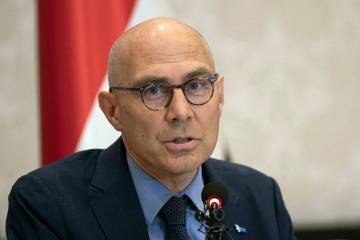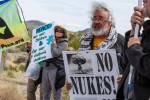Nevada objects — 229 times
Nevada reached a milestone Friday in its 30-year war to defeat the federal Yucca Mountain nuclear waste project by filing 229 challenges to the Department of Energy's license application for the planned repository 100 miles northwest of Las Vegas.
"Clearly this is a seminal day for us," state Attorney General Catherine Cortez Masto said at the Sawyer Building with Nevada Nuclear Projects Agency Director Bob Loux at her side. The state's petition was filed with the Nuclear Regulatory Commission, which is expected to take at least four years to review the application and contentions.
Loux declared the project dead.
"I do believe it's truly over," he said.
The pitfalls of entombing 77,000 tons of highly radioactive waste and spent fuel in a porous, volcanic rock ridge flanked by earthquake faults can't be fixed, he said.
In addition, Loux said, DOE's reliance on protecting waste containers from corrosion with a system of relatively short-lived titanium drip shields that haven't been invented and won't be installed until 100 years after the waste is buried is a major flaw.
"For the first time the Department of Energy is going to be legally accountable for its claims of safety that we believe are not accurate. ... Their claims will be disproved throughout this process," Loux said.
Officials for the Yucca Mountain Project had little to say about the state's challenges.
"We've just seen them. So until we've had a chance to review them, we're not going to have any comment," project spokesman Allen Benson said.
Of the 229 contentions presented to nuclear regulators, most -- 180 -- pertain to safety. The entire document has roughly 1,200 pages plus some 300 pages of attachments and affidavits.
State scientists believe geologic conditions of the mountain coupled with under-estimated corrosion rates of waste containers could result in deadly radioactive materials escaping the repository sometime before the hundreds of thousands of years that the remnants reach peak doses. Some of the equipment described in DOE's application for emplacing containers by remote control and other elements such as drip shields to divert water either don't exist or haven't been tested.
"They have not accurately estimated ground water flows in the mountain," Loux said Friday as he continued to head the State Nuclear Projects Agency until his replacement is chosen in the wake of controversy over his approval of unauthorized salary hikes in the office.
In addition, Loux noted, DOE's license application doesn't address the possibility that the ridge top could erode and climate change could impact the integrity of the site.
The Nuclear Energy Institute filed contentions as did Nye County's Nuclear Waste Repository Project Office.
Among Nye County's contentions are concerns about climate change that could increase rainfall.
"Then more water could infiltrate into the mountain faster. It is important to determine how much water and the chemistry of the water that can reach an infiltrate the repository," Nye County officials said in a release late Friday.
In addition, Nye County filed a contention jointly with neighboring counties about the potential hazard from military aircraft in the area.
"DOE provides no basis for its assumption that the Air Force will restrict its activities in the repository vicinity," the release states.
The institute, which is the lobbying arm of the nuclear power industry, submitted nine challenges covered in 307 pages.
They focus on improvements to the repository's design, said Paul Seidler, senior director of the institute's Nevada office in Henderson.
The institute, he said, "supports the Yucca Mountain Project and believes it is based on solid technical and scientific data."
But Loux said the technical and scientific data is not as solid as DOE has portrayed it.
For example, on the issue of corrosion of the alloy-22 waste canisters, Loux said, "once we read the license application, it is clear DOE has relied only on literature review and has actually done no research whatsoever."
On the other hand, the state's research, which he described as extensive, shows the canisters would corrode 50 years or 60 years after they are loaded with waste and placed inside the mountain.
Referring to the new administration under President-elect Barack Obama, Loux noted that it's "clear through statements from his transition team that they do intend to stop and terminate the Yucca Mountain Project at some point.
"And I think these contentions will also contribute to this notion that Yucca Mountain is not licensable and it's clearly not worth pursuing," he said.
"Once the scientific community and others who are following this program, those in the NRC and the other regulatory agencies as well as the industry look at the seriousness of these challenges ... it is clear that DOE has been relying on supposition, been relying on hypothesis and very little of their presentation and their safety case is really based on actual data," Loux said.
So, what should be done with the waste?
Said Masto: "For our purposes, I think it's safe where it is right now" in storage at out-of-state reactor sites across the country.
Contact reporter Keith Rogers at krogers@ reviewjournal.com or 702-383-0308.
HIGHLIGHTS Some of the contentions Nevada filed Friday with the Nuclear Regulatory Commission over the Department of Energy's license application for a nuclear waste repository at Yucca Mountain are: The plans for an above-ground facility to age nuclear waste before loading it into a maze of tunnels in the mountain fails to meet required risk standards. Post-closure plans lack adequate analysis of future wetter climate conditions. There's is no data to support DOE's assumption that drip shields, if installed a century later, will last long enough to effectively divert corrosive water around waste canisters. Impacts of sabotage involving transportation of nuclear waste to Yucca Mountain are deficient because DOE failed to evaluate "reasonably foreseeable attack scenarios." The application lacks relevant information about the risk of aircraft crashes near Yucca Mountain. DOE ignores pertinent information about the risk of volcanic events in and around the mountain that would affect the performance of the geologic repository and its system of engineered barriers. LAS VEGAS REVIEW-JOURNAL
























